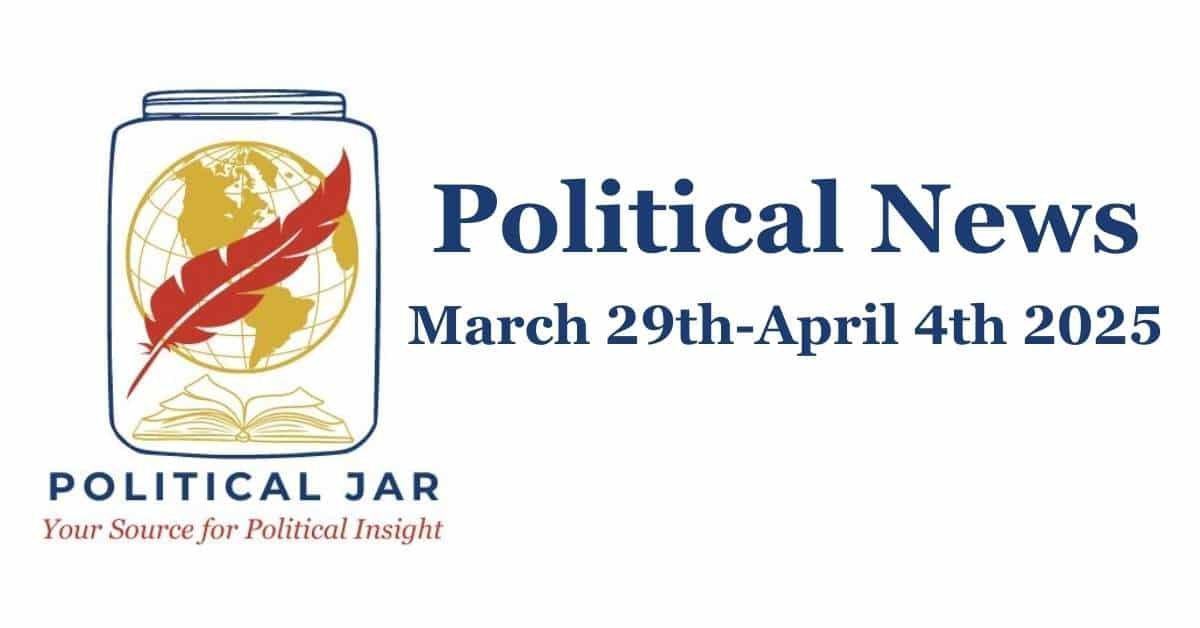
Political News Recap March 29th – April 4th 2025
Political Week in Review: March 29 – April 4, 2025
Published by Political Jar
As the first week of April 2025 wraps up, the political landscape, showcased in the political news, is brimming with developments that could define the months ahead. From economic tremors and global diplomacy to intense state-level debates and protests, the events between March 29 and April 4 signal a world in motion. At Political Jar, we’ve pulled together the most impactful political news from this week and broken down why each one matters.
1. Trump Administration Announces Massive Tariff Expansion
What Happened:
On April 2, President Donald Trump unveiled a sweeping new round of tariffs targeting a wide range of foreign goods, particularly from China, Mexico, and Germany. The new tariff schedule includes a 30% levy on Chinese electronics, a 20% tax on German automobiles, and a 15% tariff on Mexican agricultural products. The White House stated the move was necessary to “rebalance trade and protect American industries,” but business leaders and global partners quickly expressed concern.
Why It Matters:
This announcement could send shockwaves through global supply chains and spark retaliatory actions. Economists warn of rising consumer prices and potential layoffs in industries dependent on imported goods. Internationally, the move risks escalating trade tensions, particularly with China and key EU members. It’s also a major test for how American consumers and small businesses will adapt to an increasingly protectionist economic policy.
2. Congress Holds First Hearing on Project 2025 Controversies
What Happened:
On April 3, the House Oversight Committee held its first formal hearing into “Project 2025,” a growing collection of executive orders and agency restructurings enacted during President Trump’s second term. Lawmakers on both sides of the aisle questioned the legality of several of these moves, particularly those involving the newly created Department of Government Efficiency (DOGE), which is now involved in budget cuts, staff dismissals, and realignment of federal roles.
Why It Matters:
This hearing marks the beginning of what could be a long oversight battle between Congress and the executive branch. Critics argue that Project 2025 consolidates too much power in the White House, while supporters say it’s streamlining bloated bureaucracy. Either way, the decisions made here could redefine the balance of power between branches of government—and potentially the way federal agencies operate for years to come.
3. Protests Erupt Over Transgender Policy Reversal
What Happened:
Thousands of demonstrators gathered in several major U.S. cities—including Chicago, San Francisco, and Atlanta—after the Department of Education finalized new rules rolling back Title IX protections for transgender students. The revised policy allows schools to enforce gender-specific policies regarding bathroom access, sports participation, and dormitory assignments. Civil rights organizations filed multiple lawsuits immediately after the policy was published in the Federal Register.
Why It Matters:
This marks one of the most significant rollbacks of federal civil rights protections in recent memory. Advocates argue the policy violates the constitutional rights of transgender students, while supporters say it restores “local control” and “biological fairness.” Beyond the legal ramifications, this has ignited a new wave of youth-led activism that could influence the political energy of the 2026 midterms.
4. Zelensky Rejects Ceasefire Proposal Backed by Trump and Putin
What Happened:
Ukrainian President Volodymyr Zelensky formally rejected a U.S.-backed ceasefire proposal brokered between the Trump administration and Russia. The plan, which would freeze current battle lines and call for a 60-day pause in military operations, was publicly endorsed by Russian President Vladimir Putin. Zelensky denounced the deal as “a blueprint for surrender,” emphasizing that Ukraine would not accept any plan that failed to include a full Russian withdrawal.
Why It Matters:
The U.S.’s willingness to promote a ceasefire without Ukraine’s full support signals a shift in Washington’s foreign policy stance. This could strain U.S.–Ukraine relations and embolden Russia to pursue further negotiations without international consensus. It also raises questions about the long-term unity of NATO allies and whether the West is beginning to fracture in its stance on Ukraine.
5. Unemployment Rises Slightly as Markets React to Uncertainty
What Happened:
The Bureau of Labor Statistics reported a modest rise in unemployment for March, ticking up to 4.1% from 3.9% the previous month. Analysts attributed the increase to economic uncertainty tied to tariff speculation, cooling consumer confidence, and disruptions in global shipping lanes. Wall Street responded with a slight dip, while Treasury yields remained volatile throughout the week.
Why It Matters:
While still low historically, this is the first uptick in unemployment since early 2023. As markets react to policy shifts and trade uncertainty, Americans may begin to feel the effects more directly in their wallets. Rising unemployment, even if slight, could shape the economic narrative ahead of the 2026 midterms and put pressure on the administration to stabilize conditions.
6. Supreme Court Takes Up Challenge to State Abortion Bans
What Happened:
On April 1, the U.S. Supreme Court announced it will hear a consolidated case involving challenges to abortion bans in six states—Texas, Arkansas, Idaho, Mississippi, Missouri, and South Carolina. The case will examine whether state-level restrictions that include no exceptions for rape or incest violate the constitutional right to equal protection under the 14th Amendment. Arguments are set for the summer session.
Why It Matters:
This case could be one of the most consequential legal battles on reproductive rights since the overturning of Roe v. Wade. A ruling either way will have sweeping effects—either reaffirming states’ autonomy to ban abortion entirely or setting new federal limits on such laws. It could reshape national politics heading into 2026 and reignite one of the most polarizing debates in the country.
7. China and Brazil Announce New Strategic Trade Pact
What Happened:
In an unexpected move, China and Brazil signed a major bilateral trade agreement on April 4, deepening their cooperation in energy, agriculture, and digital infrastructure. The pact includes currency-exchange agreements that sidestep the U.S. dollar and opens the door to expanded Chinese investment in South American ports and renewable energy grids.
Why It Matters:
This deal is a direct challenge to U.S. influence in Latin America and could be the beginning of a broader strategic shift in global alliances. It also further demonstrates China’s ambition to establish itself as a dominant economic power in the Global South. For the United States, it underscores the importance of maintaining strong ties in the Western Hemisphere—or risk losing ground to Beijing.
Final Thoughts
This past week served as a reminder that we’re in a politically volatile era—one where the decisions made today can alter the direction of not just nations, but the global order. Whether it’s economic policy, civil rights, foreign affairs, or judicial decisions, each of these events contributes to a rapidly evolving landscape.
At Political Jar, we’ll continue tracking the headlines that matter—and asking the questions that keep power accountable.
Stay informed. Stay engaged. Stay curious.
Thank you for reading the Political Blog at Political Jar


